Analysis of the popular English poetry all over the world [The Road Not Taken] Life's bifurcation point is full of infinite possibilities
Article source: Takeaway English official website
If I had gone to another school...
If I had married someone else...
If I hadn't resigned...
If I hadn't gone abroad...
Life is full of infinite possibilities, but sometimes there is no turning back when you choose. Do you have the confidence to step out of your decision at a fork in your life, with or without the footsteps of your predecessors? We are always faced with various choices in life, and there are countless, always facing various challenges such as student days, work career, family life, etc. If we want to leave our comfort zone, but gradually lose the courage to try, but if we are afraid of making mistakes and hold back , it is possible to lose more as a result. Stefanie Sun's "Rainy Day" sounded in my ears: "Standing at the intersection of the crossroads...how should I go...I just want to turn back..."
Today I introduce a popular English poem [The Road Not Taken], which is the most famous poem by Robert Frost, the most popular American poet in the twentieth century, from TV commercials, music creation, video games, graduation There are traces of it in speeches. This is a poem that explores "the complex and contradictory moods, beliefs and determinations of choice". The words of the poem are simple and unpretentious, but the rhythm is clear and the mood is beautiful, and the meaning is meaningful and endless. On the surface, it describes the traveler's hesitant mood in the face of a fork in the road, but in fact it implies that the path of life is determined by oneself. Everyone can be touched by this poem, dedicated to you who have faced a choice or are now lost. Which path will you choose?
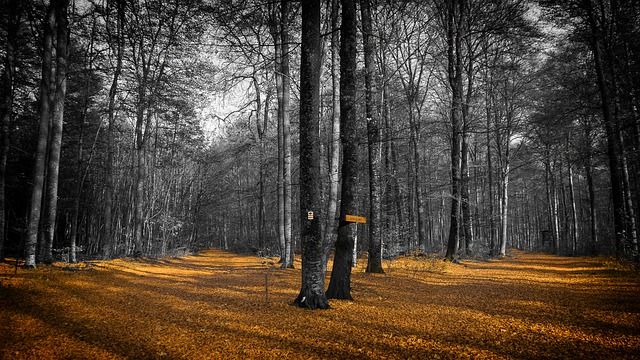
Poem title: Why The Road Not Taken instead of The Road Less Traveled?
The author did not use "The Road Less Traveled" as the title, not emphasizing the need to take a maverick road, but focusing on "Choice of Opportunities". If you choose the road that the author did not take, "The Road Not Taken"?
Faced with a dilemma, the author chose one path, but was full of reverie about the other. If he had made a different choice at the time, would his life have been different? The title suggests to us that this poem is about the complexity, contingency, and mystery of choice, reminding us that life is inherently full of possibilities, and not just about choosing the path we don’t want to follow.
[English Poetry Appreciation] The first paragraph: How to make a choice at a crossroad?
Two roads diverged in a yellow wood,
And sorry I could not travel both
And be one traveler, long I stood
And looked down one as far as I could
To where it bent in the undergrowth ;
- diverge verb v. (roads, etc.) fork, diverge + from, their paths diverged
- bend verb v. (bend/bent/bent) to bend + down/over. The road bends to the right.
- undergrowth nounn. (under a tree) undergrowth, bushes
In the first sentence, let us follow the poet into the forest and start the journey of life. Here, the yellow leaves of "yellow wood" are used to symbolize the bleak autumn, a season of sadness and helplessness. Here the poet uses it to express that he has Bravely leave the comfort zone, face the two intersections of life, want to open up a new pattern and face new challenges. "Sorry" doesn't necessarily mean feeling sorry or sad, it just feels pity or regret not being able to choose different paths at the same time. "long I stood for a long time" shows that the poet is not in a hurry or reckless when facing the crossroads of life at this moment. The so-called haste makes waste, haste is not enough, doing things in a hurry, it is easy to do wrong things. "as far as I could" means that the poet has exhausted all resources to evaluate, it may be to listen to his inner voice, or to think about his own interests and abilities. When faced with the choice of the intersection of life, he is not arrogant, but humble Yes, by all means to find out. "Undergrowth" refers to the bushes under the big trees. Seeing that the road is hidden in the bushes deep in the jungle at the end, maybe the poet saw something, so he didn't choose this road...
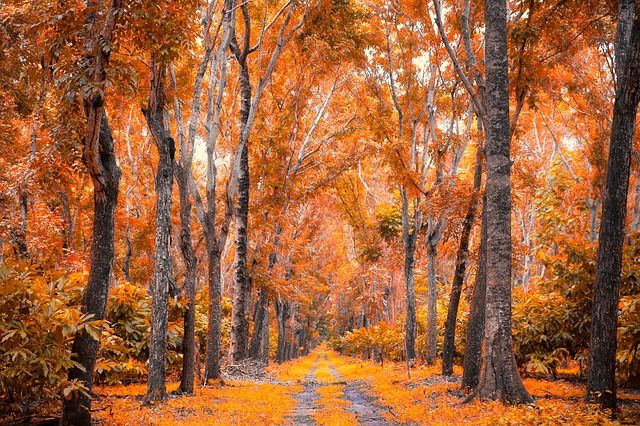
【English Poem Appreciation】Second paragraph: Although it is difficult to choose, a decision is made
Then took the other, as just as fair , just as fair, just as fair
And having perhaps the better claim , maybe it gives me a better reason to choose
Because it was grassy and wanted wear ;
Though as for that the passing there
Had worn them really about the same
- just adjective adj. proper, just, fair, deserving
- fair adjective adj. beautiful, fair, honest, quite
- claim noun n. claim, claim, here means "reason" claim on sth.
- grassy adj. grassy
- wear verb v. (wear/wore/worn), noun n. wear, use
"Then" is very important, it means that he made a choice decisively. After the poet looked at the first path, then chose the second path. The first path should have seen something and made a choice. "just" and "fair" have many different meanings. The two words seem to be synonymous, but if the poet uses the two words but only conveys the same meaning "fair", it will be redundant, so this means different meanings , "as just" is used here instead of more just, which means that both paths seem to be balanced and appropriate, and both seem to be the right choices. Choosing a life path not only evaluates one's own talents, but also evaluates one's own interests. Is choosing this career what society needs? "as fair" here refers to the beautiful. These two paths are both attractive and attractive. In response to the theme of this poem, it is sometimes difficult to make a choice in the journey of life. There is no right or wrong choice of paths, but determines our future. "better claim" poets think that they have made a better choice. No matter what choice we make, we all want to prove ourselves right. This is human nature. Poets use "perhaps" because they cannot predict the future and cannot be 100% sure about themselves. The choice is not correct.
"Grassy is overgrown with grass", which symbolizes the road that no one tramples on. It is the road that few people choose. It may be a more difficult road. The author chose a unique road that is different from ordinary people. If this road "wanted wear" is translated as "Those with few footprints" lack charm. As mentioned earlier, poets do not need to use two words to express the same meaning, so here it is interpreted as "thirst for human footprints", and the drafting will be humanized to want to be worn. The green grass seems to be waiting for travelers to trample on it. The choice of career future, in addition to considering the unique way of grassy, also consider the way of wanting wear with social needs. "as for that" refers to the second road that few people take, the road chosen by the poet, although passing there through this road, but the two roads are actually almost the same "had worn them really about the same" sparsely populated . Just when we think the poet has made a better choice, the poet really seems undecided, and the two paths seem to be the same. People are hesitant and confused only at similar choices, and this is the mood of the poet at this moment.
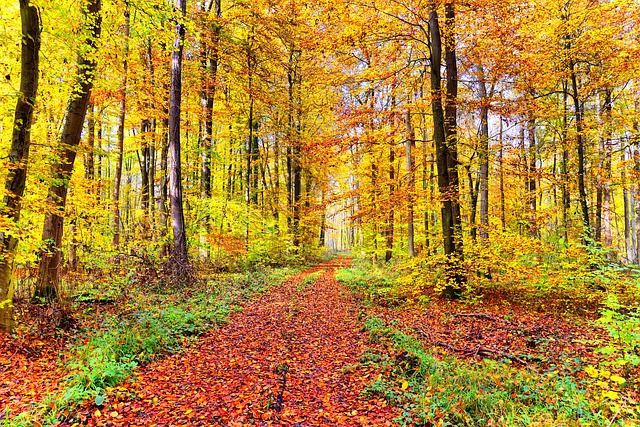
[English Poetry Appreciation] The third paragraph: It seems that I regret my choice
And both that morning equally lay
In leaves no step had trodden black.
Oh, I kept the first for another day! Oh! I'll leave the first way to another day!
Yet knowing how way leads on to way,
I doubted if I should even come back.
- equally adverb adv. equally, equally
- tread verb v. (tread/trod/trodden)
to tread the same path as sb.
to tread a dangerous path
In the third paragraph, the poet pulls the time back to the fork in the woods in the morning. "both" refers to those two roads, continuing the same in the previous paragraph. "equally" means that the two roads are equal and freely chosen. I hear these two roads again. It is equal, "In leaves no step had trodden black" is covered under the fallen leaves and there is no trace of trampling. The poet may be the first person to come here that morning. We originally thought that the poet chose grassy green grass. The road, maybe the leaves are thinly covered on the grass, maybe the leaves fall between the grass, maybe the poet is not very honest...
"Oh, I kept the first for another day! Oh! I kept the other way for another day!" The poet seemed to regret missing the first way and wanted to take a look at another day. The exclamation mark was used at the end of the sentence, representing the poet's strong Emotions. When people have a choice barrier, they often reassure themselves that they can do it all over again. "knowing how way leads on to way", "I doubted if I should even come back" Then the poet realizes that it is foolish to revisit the old places, the road on earth is endless, he understands that one journey will lead to another, I am afraid It is impossible to go back and choose again. Just like in life decisions, we always think that we can do it all over again, but in fact, many things are difficult and impossible to repeat, such as school choices, career choices, and love choices. The reality is often much more complicated.
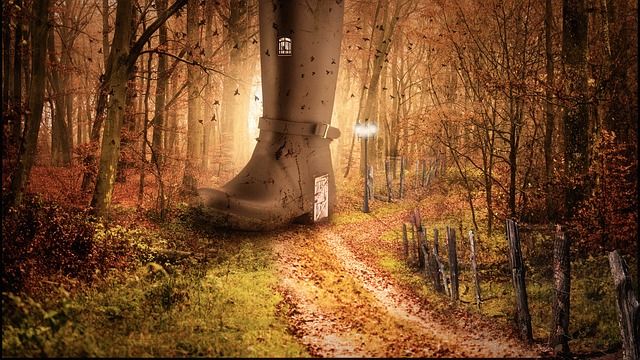
[English Poetry Appreciation] The last paragraph: Choice creates a completely different life
I shall be telling this with a sigh
Somewhere ages and ages hence : at some point in some place many years later
Two roads diverged in a wood, and I—
I took the one less traveled by,
And that has made all the difference.
- sigh noun n. to breathe or give or heave a sigh
- a deep/long/heavy sigh
- ages noun n. a long time, many years
- hence adv.【Book】from now on, from now on, from now on
In the last paragraph, the poet thinks that he may look back on the past in the future, and he may realize that the choice of the road at this time determines the fate of his life, which pushes the thoughts of the whole poem to the climax. "I shall" jump the time to the future, "Somewhere ages and ages hence" we don't know the exact time, only that it is many years later. "telling this with a sigh" We know that the poet's story is very important, because he will still tell it after many years, pay special attention to "sigh" here is not translated as "sigh" but "sigh", he may be relieved and happy, Or remorseful and sad to talk about this experience, or it may be just a simple reflection on this matter, or it may be a bit of a pretense of relying on the old and betraying the old, but I am not sure what his "sigh" tone is, leaving readers with unlimited imagination.
The author of "Two roads diverged in a wood" repeats the first line of the poem again, without yellow responding to the theme of the poem "The Dilemma of Choice", and I add a dash to indicate a change in tone, a little hesitant to let us know the poet What comes next is important. "I took the one less traveled by," the poet sums up his story, telling us that he traveled the less traveled by, and this statement may be triumphant or regrettable. I remember that the poet said before that maybe that road is not that less people have set foot in. The two roads are actually almost the same. Because of the experience that he will describe many years later, he predicts that his memory will believe that he chose the road less people choose. , even if this is not the case.
"And that has made all the difference" at first glance, many people will interpret that the author's choice is correct, he chose the road less traveled, and created an extraordinary life, but in fact the author did not say success, only said "difference is different" , or it may become worse, difference is a clever metaphor, because people have comparisons and have different choices, so "difference" will exist. Because at this moment the poet is predicting what he will say in the future, he does not know how this road will change his life, he only knows that this choice is very important, and it will completely change his life. The poem comes to an abrupt end here, leaving space for readers to imagine and contemplate.
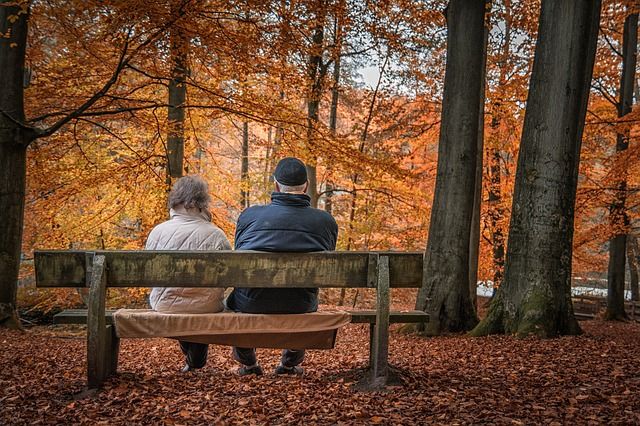
Robert Frost went through hardships and pains in his life. He lost his father in childhood, his wife in middle age, and his son in old age. He worked as a textile worker, shoemaker, teacher and farmer. When he was 38 years old, he made an important life decision. He gave up his stable teaching career in the United States, and decided to move to the United Kingdom with his wife to become a poet. After three years, he wrote the poem "The Road Not Taken". When writing poetry, he chooses the smooth and smooth life path of teaching, or the path full of desolation and desolation in writing poetry. But in these two kinds of life, the poet finally chooses the latter, which is unwilling to follow the world. When he looks back, he sometimes I also think about what it would be like if we took the previous road. This is also the confusion we will encounter when facing the crossroads of life.
The road of life is "different" because of "comparison", so there is happiness and regret. In fact, "different" does not exist. We cannot know the other me in parallel time and space, nor can we travel through time and space to reverse time. We can only experience one kind of life, whether we like it or not. Paradoxically, people tend to make the same decisions if they could go back in time. No matter how many critical forks in life you encounter, you will welcome them with an open heart. There is no good or bad road in life. As long as you choose with enough trust and determination, I believe that no matter which road you choose, it will be the best arrangement for us. The helplessness of life is due to the choice that cannot be turned back; the beauty of life also comes from living without regrets?
After all, we should live for ourselves. Real happiness can only be defined by ourselves, not the standards of others. In real life, "you can't have both." This poem is dedicated to everyone, be brave in another turn of life and make your own decision!
If you like my article, or think it is helpful to you, please help me like it below and share it. Your support is the driving force of creation. You are also welcome to follow the takeaway English official website , FB or IG . Thank you for your support 😊 If there is Any English topics you want to learn, welcome to leave a message to me 😉
After reading this, you can still read the next one~
Listen to Robinson's speech to learn [English words] Don't limit your "imagination"!
8 selected sentences from Oscar winner "Nomad Life" [Famous English Quotes] Fill the gap in your heart and embark on a road journey with no end!
Like my work? Don't forget to support and clap, let me know that you are with me on the road of creation. Keep this enthusiasm together!

- Author
- More